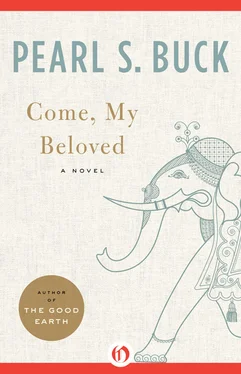“What church will you join?”
“None, for if I join one then the others will not allow me to belong to them. I have inquired of this of my teacher, Mr. Fordham, who explains Christianity to us every week twice, as you know. From him I understand that church is good for many people but also I see it is not good for me, because I wish to belong everywhere, to everyone, only first to Christ and only to Christ.”
“Does he know you wish to become a sadhu?” Ted asked.
“I have not told him,” Jehar replied.
“And what makes you think that you know best how to follow Christ?”
“I do not know, except for myself,” Jehar said. He laughed unexpectedly, a pleasant boyish laughter. “I am not so stupid as that, surely, so that I think I can decide for others. It is only for myself that I know.”
“So you will take a bowl, a blanket—”
“I will take my bowl, my blanket, and I shall wear my saffron robe, so that men know I am a sadhu, but I shall preach only Christ.”
“Jehar, you make me afraid. It is so absolute.”
“Why are you afraid? I simply do what many have done, except I am of Christ. Siva and Ram I do not condemn, Kali I will not worship, nor Ganesh, for I cannot see them good or beautiful. But Christ I see is beautiful because he committed no crime and he harmed no one, and he spoke of God.”
“This one thing I will say,” Ted replied, after a moment, “you are renouncing the life of a man before you know what it is. I have seen Indians renounce life, Jehar. I saw Darya himself in prison.”
All India knew the name of Darya, and Jehar lifted his head in interest. “Did you see him indeed?”
“Yes, and he, too, has renounced everything except it is for his country, or so he believes. But he is not a young man as you are. He has known marriage and fatherhood, and only after these were taken from him did he accept renunciation.”
“I have no need to wait,” Jehar said confidently. “I have had a vision. Perhaps Darya had no vision until God had taken from him his wife and his children.”
“What vision had you?” Ted asked. It was impossible to be less than gentle with Jehar.
“I saw Christ plain,” Jehar replied. “It was not a vision of the spirit, you understand. There are such visions also, but I saw him with these very eyes.”
He touched his eyes with his two forefingers.
“I have read the books,” he went on. “I knew the Bhagavad Gita by heart before my mother died. She taught me that to be a saint is the best that man can know, but I did not think I could be a saint, and so I was unhappy. When I first came to this university how unhappy I was, and I did not like to hear of the new religion. It seemed not so good to me as our own more ancient faith. Once I even tore to pieces the Bible Mr. Fordham said we must use in the class room. I was so unhappy to read it. I did not wish to be compelled by him. And then suddenly I saw Christ, there in my lonely room.”
Ted sighed. “I hope you have not changed your whole life because of this — vision, as you say it is.”
“I have changed my life,” Jehar replied.
What more could be said? Jehar was simple and pure and quiet and he could not be changed. The sun tipped the edge of the horizon red gold, and coolness faded quickly from the air. The day had begun. The two young men rose and walked together across the lawn and parted with a handclasp and no spoken word.
Thus harmlessly begun, the day developed into a strange storm, not between Sirdar Singh and Jehar but between Ted and his father, who had never quarreled before. He had half expected to be called into the conference between his father and Jehar. At seven o’clock the first light meal of the day was served, the chota hari which was eaten wherever they happened to be. His father was already in his study. Ted accepted the tray on one of the small veranda tables and ate there, seated in a wicker armchair. Jehar passed him and lifted his hands in greeting, palm to palm, and went on into the hall and the study. The door to his father’s study closed and Ted waited, finishing his tea and toast and ripe mango and then he sat, still expecting to hear his father’s voice.
The call did not come. After more than an hour the door opened again, and Jehar came out, looking pale and almost weary. Again he passed with the silent greeting and without speech he descended the steps and went away. Then Ted got up and went to the study. His father sat at the desk reading some papers, his face stern.
“Father?”
His father looked up. “Yes, Ted?”
“How did it go?”
“You mean the conference? I am convinced that Jehar is out of his mind. He talked of visions.”
Courage, Ted thought, courage to speak, to take Jehar’s side, to declare that visions are possible.
“There is plenty of evidence for visions in the Scriptures, Father.”
His father stared at him. “Surely you are not going to justify Jehar?”
“Only to say that there is scriptural justification for visions.”
“Ignorant men wrote the Scriptures, as you very well know,” his father retorted. “They put into concrete form the feelings of their hearts. I do not expect that sort of thing from the graduates of my university.”
“I wonder if Jehar has not decided upon a rather brilliant act, nevertheless?”
“What do you mean?” his father demanded.
“I mean, we have tried our way of preaching Christianity for some hundreds of years, churches and hospitals and universities, all this you have here, but it doesn’t make Christians.”
“It does make Christians,” his father said harshly. “There is a statistical gain every year in Indian church membership.”
“No real gain,” Ted said doggedly, “The villages are as they have been for all these hundreds of years. I saw no sign of Christianity there, Father. The same old poverty, the same old misery, the same greed of the zamindars and the landowners, the same ruthlessness of the rich over the poor, the evil over the good—”
“These things have always been and always will be,” his father said.
“Then of what good is Christianity?” Ted cried passionately.
He met his father’s astonished eyes, he saw his father’s concern, and he leaped to deny his father’s faith.
“Jehar is right,” he cried. “I wish I had the guts to be like him! I wish I could give up all and follow Christ!”
There was a look of real terror in his father’s eyes and this at last he could not face. He turned and strode away.
What had he said? He had said that he wished he could give up all and follow Christ. But what did that mean? He stopped in the big empty drawing room. As clearly as Jehar had said he saw the face of Christ, he saw the face before his eyes. It was the face of a peasant, a nameless face, a face he had seen in one of the scores of villages through which he had passed, had seen and had forgotten, but it had hidden itself in the folds of his brain, a face twisted with pain and labor and starvation, a hopeless face except for the deathless burning eager eyes, and the eyes demanded of him, “Is there no hope for me?”
He stared at this face, and while the eyes made their demand upon him, he heard the door to his father’s study suddenly close.
Alone in his study David fell to his knees. He had turned the key in the lock, ashamed, or perhaps only shy, lest he be discovered in prayer at this hour. But he was driven to prayer, for now he was afraid for his beloved and only son. All the year since Ted first came back to him he had waited for the time when he could speak freely to Ted, when he could tell his son his problems and the fearful weight of his task, and he had not spoken. He had been confused with memories. When he looked at Ted, he saw his own father, as he might have been when young, and yet Ted was like Olivia, he had Olivia’s ways, her quick feelings. And thus confused and accustomed to loneliness, he had not spoken to his son even of his fears and burdens.
Читать дальше












